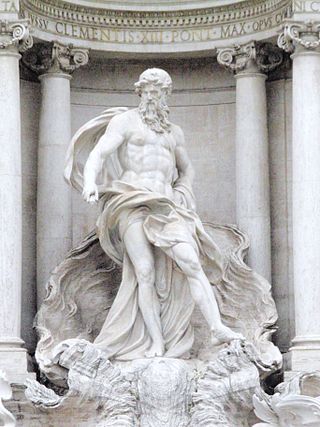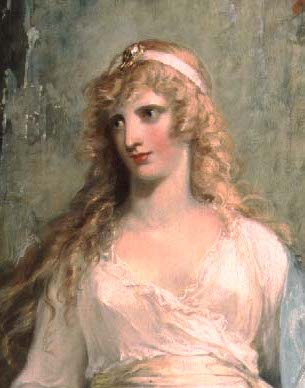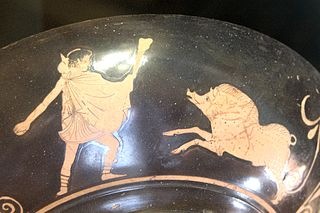
Aeacus was a king of the island of Aegina in Greek mythology. He was a son of Zeus and the nymph Aegina, and the father of the heroes Peleus and Telamon. According to legend, he was famous for his justice, and after he died he became one of the three judges in Hades alongside Minos and Rhadamanthos. In another story, he assisted Poseidon and Apollo in building the walls of Troy.

Zeus is the sky and thunder god in ancient Greek religion and mythology, who rules as king of the gods on Mount Olympus. His name is cognate with the first syllable of his Roman equivalent Jupiter.

In Greek mythology, Oceanus was a Titan son of Uranus and Gaia, the husband of his sister the Titan Tethys, and the father of the river gods and the Oceanids, as well as being the great river which encircled the entire world.

Aglaea or Aglaïa is one of the three Charites or Gratiae (Graces) in Greek mythology.
There were several figures named Elatus or Élatos in Greek mythology.

In Greek mythology, Amphiaraus or Amphiaraos was the son of Oicles, a seer, and one of the leaders of the Seven against Thebes. Amphiaraus at first refused to go with Adrastus on this expedition against Thebes as he foresaw the death of everyone who joined the expedition. His wife, Eriphyle, eventually compelled him to go.
In Greek mythology, Catreus or Katreus was the eldest son of Minos and Pasiphaë, and Minos' successor as king of Crete. Catreus had one son, Althaemenes, and three daughters, Apemosyne, Aerope and Clymene. Catreus was mistakenly killed by his son Althaemenes thereby fulfilling an oracle's prophecy.

In Greek mythology, Phorcys or Phorcus is a primordial sea god, generally cited as the son of Pontus and Gaia (Earth). Classical scholar Karl Kerenyi conflated Phorcys with the similar sea gods Nereus and Proteus. His wife was Ceto, and he is most notable in myth for fathering by Ceto a host of monstrous children. In extant Hellenistic-Roman mosaics, Phorcys was depicted as a fish-tailed merman with crab-claw legs and red, spiky skin.
In Greek mythology, Zelus or Zelos was the daimon that personifies dedication, emulation, eager rivalry, envy, jealousy, and zeal. The English word "zeal" is derived from his name.
In Greek mythology, Thaumas was a sea god, son of Pontus and Gaia, and the full brother of Nereus, Phorcys, Ceto and Eurybia.
In Greek mythology, Abderus or Abderos was a divine hero, reputed by some to be one of Heracles' lovers (eromenoi), and reputedly a son of Hermes by some accounts, and eponym of Abdera, Thrace.
Agelaus or Agelaos is, in Greek mythology, the name of various individuals.

In Greek mythology, Calypso was a nymph who lived on the island of Ogygia, where, according to Homer's Odyssey, she detained Odysseus for seven years. She promised Odysseus immortality if he would stay with her, but Odysseus preferred to return home.

The Crommyonian Sow is a pig in Greek mythology. It was owned by a woman named Phaea and was sometimes called by that name itself.

The Potamoi are the gods of rivers and streams of the earth in Greek mythology.
Achiroë, Anchirrhoë (Ἀγχιρρόη), or Anchinoë (Ἀγχινόη), which is perhaps a mistake for Anchiroë, was in Greek mythology an Egyptian naiad, as daughter of the river-god Nilus. She was the wife of King Belus of Egypt, by whom she became the mother of Aegyptus and Danaus, and, according to some accounts, Cepheus, and Phineus.
In Greek mythology, Chione was the daughter of Boreas, the god of the north wind, and Orithyia a daughter of Erechtheus, king of Athens. Chione was the sister of Cleopatra and the Argonauts, Calaïs and Zetes. According to a late, though generally accepted tradition, Chione was the mother of Poseidon's son Eumolpus whom she threw into the ocean for fear of her father's reaction; however, Eumolpus is rescued and raised by Poseidon.
In Greek mythology, Cepheus was a king of Tegea in Arcadia. He was an Argonaut, and was, along with most of his twenty sons, killed in Heracles' war against Hippocoon, king of Sparta. He was perhaps the same Cepheus who, according to the mythographer Apollodorus, participated in the Calydonian boar hunt.
In Greek mythology, Electra was one of the 3,000 Oceanids, water-nymph daughters of the Titans Oceanus and his sister-spouse Tethys.
In Greek mythology, Melia was an Oceanid, one of the 3,000 water nymph daughters of the Titans Oceanus and his sister-spouse Tethys. She was the mother of culture hero Phoroneus, and Aegialeus, by her brother Inachus, the river-god of Argos. However, in some accounts, Inachus fathered Phoroneus by an Oceanid nymph named Argia. According to Argive tradition, Phoroneus was the first man, or first inhabitant of Argos, who lived during the time of the Great Flood, associated with Deucalion.
![]() This article incorporates text from a publication now in the public domain : Smith, William (1870). "Apollodorus". In Smith, William (ed.). Dictionary of Greek and Roman Biography and Mythology . Vol. 1. p. 235.
This article incorporates text from a publication now in the public domain : Smith, William (1870). "Apollodorus". In Smith, William (ed.). Dictionary of Greek and Roman Biography and Mythology . Vol. 1. p. 235.







